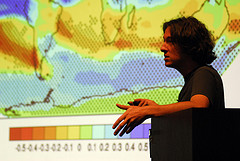
We face a serious scientific gap in understanding crop substitution, current models assume that a maize farmer today will be a maize farmer tomorrow. In reality, many will need to select a different crop to what they have now.
Perhaps Marshall Burke and his team will now crank the machine and make some genetically nuanced predictions about how much change of crops — rather than varieties within a crop — might be needed. But that will require some pretty fundamental understanding of how and under what circumstances farmers adopt new (or old) crops and how best to facilitate that process. How much do the social anthropologists know about this?
Corn and Capitalism: How a Botanical Bastard Grew to Global Dominance, which I’ve mentioned before, has many insights into the factors that resulted in the rapid uptake of maize in Africa. But can the factors that promoted maize be easily reversed to favour sorghum or pearl millet? I have no idea, but I doubt it. How many crop failures will it take before either farmers or their advisors are willing to try something new?
And in other climate change news, a series of policy briefs from the International Food Policy Research Institute sets out An Agenda for Negotiation in Copenhagen. Detailed proposals are in the briefs. Executive summary:
- Investments. There must be explicit inclusion of agriculture-related investments, especially as part of a Global Climate Change Fund.
- Incentives. There must be a deliberate focus on introducing incentives to reduce emissions and support technological change.
- Information. There must be a solid commitment to establishing comprehensive information and monitoring services in soil and land use management for verification purposes.
Stay tuned.